#george balfour
Text
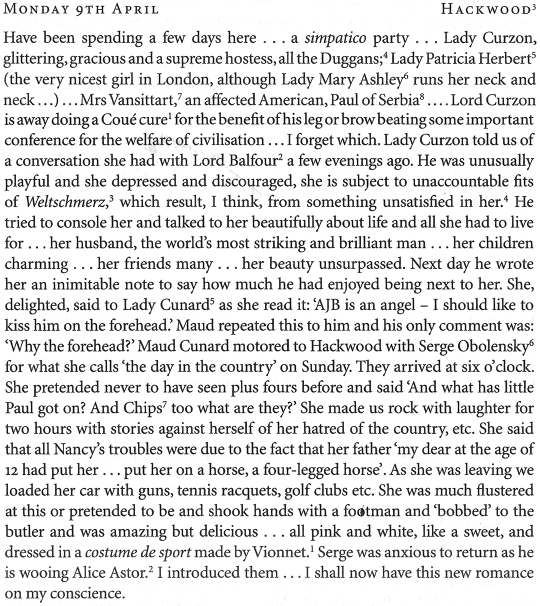
Henry ‘Chips’ Channon: The Diaries (Vol. 1), 1918-38, entry for 9th April 1923
—
Monday 9th April — Hackwood¹
Have been spending a few days here … a simpatico party … Lady Curzon, glittering, gracious and a supreme hostess, all the Duggans;² Lady Patricia Herbert³ (the very nicest girl in London, although Lady Mary Ashley⁴ runs her neck and neck …) … Mrs Vansittart,⁵ an affected American, Paul of Serbia⁶ …. Lord Curzon is away doing a Coué cure⁷ for the benefit of his leg or brow beating some important conference for the welfare of civilisation … I forget which. Lady Curzon told us of a conversation she had with Lord Balfour⁸ a few evenings ago. He was unusually playful and she depressed and discouraged, she is subject to unaccountable fits of Weltschmerz,⁹ which result, I think, from something unsatisfied in her.¹⁰ He tried to console her and talked to her beautifully about life and all she had to live for … her husband, the world’s most striking and brilliant man … her children charming … her friends many … her beauty unsurpassed. Next day he wrote her an inimitable note to say how much he had enjoyed being next to her. She, delighted, said to Lady Cunard¹¹ as she read it: ‘AJB is an angel — I should like to kiss him on the forehead’. Maud repeated this to him and his only comment was: ‘Why the forehead?’ Maud Cunard motored to Hackwood with Serge Obolensky¹² for what she calls ‘the day in the country’ on Sunday. They arrived at six o’clock. She pretended never to have seen plus fours before and said ‘And what has little Paul got on? And Chips¹³ too what are they?’ She made us rock with laughter for two hours with stories about herself and her hatred of the country, etc. She said that all Nancy’s troubles were due to the fact that her father ‘my dear at the age of 12 had put her … put her on a horse, a four-legged horse’. As she was leaving we loaded her car with guns, tennis racquets, golf clubs, etc. She was much flustered at this or pretended to be and shook hands with a footman and ‘bobbed’ to the butler and was amazing but delicious … all pink and white, like a sweet, and dressed in a costume de sport made by Vionnet.¹⁴ Serge was anxious to return as he is wooing Alice Astor.¹⁵ I introduced them … I shall now have this new romance on my conscience.
—
1. Hackwood Park, near Basingstoke in Hampshire, rented by Lord Curzon from 1906 until 1925.
2. Lady Curzon’s children by her first marriage: Alfred Duggan (1903–64), who became a minor novelist; Hubert Duggan (1904–43), Tory MP for Acton from 1931 to 1943 and anti-appeaser in the 1930s; and (Grace) Marcella Duggan (1907–95).
3. Patricia Herbert (1904–94), by courtesy Lady Patricia Herbert from 1913, daughter of the 15th Earl of Pembroke and 12th Earl of Montgomery, married in 1928 William Henry Smith, 3rd Viscount Hambleden (1903–48). She was a Lady of the Bedchamber to Queen Elizabeth from 1937 until 1994.
4. Lady Mary Sibell Ashley-Cooper (1902–36), daughter of the 9th Earl of Shaftesbury, married in 1928 Napier George Henry Sturt (1896–1940), who in 1919 succeeded his father as 3rd Baron Alington of Crichel. He died on active service in Egypt during the Second World War, though of drink rather than in action.
5. Gladys Robinson-Duff (1892–1928), daughter of General William C. Heppenheimer of the United States, married in 1921 Robert Gilbert Vansittart (1881–1957), who would be Permanent Under-Secretary at the Foreign Office from 1930 to 1938, and who would be raised to the peerage in 1941 as 1st Baron Vansittart. Vansittart was also an accomplished novelist, playwright and poet.
6. Prince Paul of Yugoslavia (1893–1976) had known Channon at Oxford and would remain one of his closest friends, and be Prince Regent of Yugoslavia (the Kingdom of the Serbs, Croats and Slovenes) from 1934 to 1941 during the minority of Peter II. He was the nephew of King Peter I and married Princess Olga of Greece and Denmark (1903–97), sister-in-law of Channon’s other closest friend, the Duke of Kent. After treating with the Germans in 1941 Paul was forced from Yugoslavia and forbidden ever to return; the post-war communist regime stripped him of his property and proclaimed him an enemy of the state. Until 1945 the British authorities held him in Kenya under house arrest. Serbia rehabilitated him posthumously in 2011, after which he was reburied with Princess Olga and their son Nicholas.
7. A psychotherapy-based cure featuring auto-suggestion, fashionable but heavily criticised at the time, developed by Émile Coué de la Châtaigneraie (1857–1926), a French psychologist.
8. A. J. Balfour, raised to an earldom in 1922.
9. World-weariness.
10. Curzon was desperate for a male heir (he had three daughters from his first marriage) to the earldom and marquessate he had obtained; various medical procedures had been followed to help Lady Curzon conceive, but no child resulted and the marriage was strained accordingly.
11. Maud Alice Burke (1872–1948), born in San Francisco, married in 1895 Sir Bache Cunard, 3rd Bt (1851–1925), grandson of the shipping line’s founder. They had lived largely apart since 1911, Cunard basing himself in Leicestershire where he enjoyed field sports. In London with their daughter Nancy Clara (1896–1965), Lady Cunard – who after her husband’s death became known as ‘Emerald’ – established one of the leading salons of the era, which thrived until the Second World War. After separating from her husband she became the mistress of Sir Thomas Beecham, the conductor, and funded many of his musical projects.
12. Prince Sergei (‘Serge’) Platonovich Obolensky Neledinsky-Meletsky (1890–1978) had been educated at Oxford and became part of the Russian diaspora after the revolution. He emigrated to America and became a successful businessman.
13. The first time in the diaries that he refers to his nickname.
14. Madeleine Vionnet (1876–1975) was one of Paris’s leading fashion designers of the interwar years.
15. Ava Alice Muriel Astor (1902–56), daughter of John Jacob Astor IV. She and Obolensky married in 1924 and divorced in 1932. She would marry four times before her death at the age of 54.
#chips channon#channon diaries#1923#1920s#grace curzon#alfred duggan#hubert duggan#marcella rice#patricia hambleden#mary alington#gladys vansittart#prince paul of yugoslavia#george curzon#arthur balfour#emerald cunard#prince serge obolensky#nancy cunard#madeleine vionnet#alice astor#hackwood park
6 notes
·
View notes
Text
دوافع صدور وعد بلفور
دوافع صدور وعد بلفور
دوافع صدور وعد بلفور
الكاتب : قادة دين
الملخص:
يسعى البحث لتقديم أهم الأسباب التي وقفت خلف إصدار وعد بلفور، ولعبت دورا مهما في إقدام الحكومة البريطانية على تحمل مسؤولية القيام بهذه الخطوة، والتي يمكن حصرها في: – تأثير ظهور المسيحية المتصهينة: حيث دفع ظهور المذهب البروتستانتي وانتشاره في بريطانيا أساسا، وشيوع كثير من المفاهيم المرتبطة بالعقيدة الإنجيلية الجديدة، التي تجعل من…
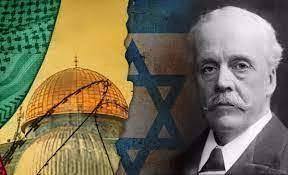
View On WordPress
#Arab revolution#Balfour#British government#Christian Zionist#Declaration#Dzeraili#evangelism#Israel#Lloyd George#Lord Palmerston#Ottoman Empire#Palestine#Protestantism#Rothschild#اليهود#الصهيونية#بلفور؛ وعد؛ فلسطين؛ الحكومة البريطانية؛ لويد جورج
0 notes
Text
دوافع صدور وعد بلفور
دوافع صدور وعد بلفور
دوافع صدور وعد بلفور
الكاتب : قادة دين
الملخص:
يسعى البحث لتقديم أهم الأسباب التي وقفت خلف إصدار وعد بلفور، ولعبت دورا مهما في إقدام الحكومة البريطانية على تحمل مسؤولية القيام بهذه الخطوة، والتي يمكن حصرها في: – تأثير ظهور المسيحية المتصهينة: حيث دفع ظهور المذهب البروتستانتي وانتشاره في بريطانيا أساسا، وشيوع كثير من المفاهيم المرتبطة بالعقيدة الإنجيلية الجديدة، التي تجعل من…
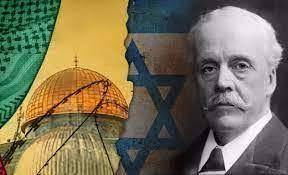
View On WordPress
#Arab revolution#Balfour#British government#Christian Zionist#Declaration#Dzeraili#evangelism#Israel#Lloyd George#Lord Palmerston#Ottoman Empire#Palestine#Protestantism#Rothschild#اليهود#الصهيونية#بلفور؛ وعد؛ فلسطين؛ الحكومة البريطانية؛ لويد جورج
0 notes
Text
when the British Empire's researchers realized that the cause of the ecological devastation was the British Empire:

much to consider.
on the motives and origins of some forms of imperial "environmentalism".
---
Since the material resources of colonies were vital to the metropolitan centers of empire, some of the earliest conservation practices were established outside of Europe [but established for the purpose of protecting the natural resources desired by metropolitan Europe]. [...] [T]ropical island colonies were crucial laboratories of empire, as garden incubators for the transplantation of peoples [slaves, laborers] and plants [cash crops] and for generating the European revival of Edenic discourse. Eighteenth-century environmentalism derived from colonial island contexts in which limited space and an ideological model of utopia contributed to new models of conservation [...]. [T]ropical island colonies were at the vanguard of establishing forest reserves and environmental legislation [...]. These forest reserves, like those established in New England and South Africa, did not necessarily represent "an atavistic interest in preserving the 'natural' [...]" but rather a "more manipulative and power-conscious interest in constructing a new landscape by planting trees [in monoculture or otherwise modified plantations] [...]" [...].
Text by: Elizabeth DeLoughrey and George B. Handley. "Introduction: Toward an Aesthetics of the Earth". Postcolonial Ecologies: Literatures of the Environment, edited by DeLoughrey and Handley. 2011.
---
It is no accident that the earliest writers to comment specifically on rapid environmental change in the context of empires were scientists who were themselves often actors in the process of colonially stimulated environmental change. [...] As early as the mid-17th century [...] natural philosophers [...] in Bermuda, [...] in Barbados and [...] on St Helena [all British colonies] were all already well aware of characteristically high rates of soil erosion and deforestation in the colonial tropics [...]. On St Helena and Bermuda this early conservationism led, by 1715, to the gazetting of the first colonial forest reserves and forest protection laws. On French colonial Mauritius [...], Poivre and Philibert Commerson framed pioneering forest conservation [...] in the 1760s. In India William Roxburgh, Edward Balfour [...] ([...] Scottish medical scientists) wrote alarmist narratives relating deforestation to the danger of climate change. [...] East India Company scientists were also well aware of French experience in trying to prevent deforestation [...] [in] Mauritius. [...] Roxburgh [...] went on to further observe the incidence of global drought events which we know today were globally tele-connected El Nino events. [...] The writings of Edward Balfour and Hugh Cleghorn in the late 1840s in particular illustrate the extent of the permeation of a global environmental consciousness [...]. [T]he 1860s [were] a period which we could appropriately name the "first environmental decade", and which embodies a convergence of thinking about ecological change on a world scale [...]. It was in the particular circumstances of environmental change at the colonial periphery that what we would now term "environmentalism" first made itself felt [...]. Victorian texts such as [...] Ribbentrop's Forestry in the British Empire, Brown's Hydrology of South Africa, Cleghorn's Forests and Gardens of South India [...] were [...] vital to the onset of environmentalism [...]. One preoccupation stands out in them above all. This was a growing interest in the potential human impact on climate change [...] [and] global dessication. This fear grew steadily in the wake of colonial expansion [...]. Particularly after the 1860s, and even more after the great Indian famines of 1876 [...] these connections encouraged and stimulated the idea that human history and environmental change might be firmly linked.
Text by: Richard Grove and Vinita Damodaran. "Imperialism, Intellectual Networks, and Environmental Change: Origins and Evolution of Global Environmental History, 1676-2000: Part I". Economic and Political Weekly Vol. 41, No. 41. 14 October 2006.
---
Policing the interior [of British colonial land] following the Naning War gave Newbold the opportunity for exploring the people and landscape around Melaka […]. Newbold took his knowledge of the tropical environment in the Straits Settlements [British Malaya] to Madras [British India], where he earned a reputation as a naturalist and an Orientalist of some eminence. He was later elected Fellow of the Royal Society. Familiar with the barren landscape of the tin mines of Negeri Sembilan, Newbold made a seminal link between deforestation and the sand dune formations and siltation […]. The observation, published in 1839 […], alerted […] Balfour about the potential threat of erosion to local climate and agriculture. […] Logan brought his Peninsular experience [in the British colonies of Malaya] directly within the focus of the deforestation debate in India […]. His lecture to the Bengal Asiatic Society in 1846 […] was hugely influential and put the Peninsula at the heart of the emerging discourse on tropical ecology. Penang, the perceived tropical paradise of abundance and stability, soon revealed its vulnerability to human [colonial] despoilment […].
Text by: Jeyamalar Kathirithamby-Wells. "Peninsular Malaysia in the Context of Natural History and Colonial Science". New Zealand Journal of Asian Studies 11, 1. June 2009.
---
British colonial forestry was arguably one of the most extensive imperial frameworks of scientific natural resource management anywhere [...]. [T]he roots of conservation [...] lay in the role played by scientific communities in the colonial periphery [...]. In India,[...] in 1805 [...] the court of directors of the East India Company sent a dispatch enquiring [...] [about] the Royal Navy [and its potential use of wood from Malabar's forests] [...]. This enquiry led to the appointment of a forest committee which reported that extensive deforestation had taken place and recommended the protection of the Malabar forests on grounds that they were valuable property. [...] [T]o step up the extraction of teak to augment the strength of the Royal Navy [...] [b]etween 1806 and 1823, the forests of Malabar were protected by means of this monopoly [...]. The history of British colonial forestry, however, took a decisive turn in the post-1860 period [...]. Following the revolt of 1857, the government of India sought to pursue active interventionist policies [...]. Experts were deployed as 'scientific soldiers' and new agencies established. [...] The paradigm [...] was articulated explicitly in the first conference [Empire Forestry Conference] by R.S. Troup, a former Indian forest service officer and then the professor of forestry at Oxford. Troup began by sketching a linear model of the development of human relationship with forests, arguing that the human-forest interaction in civilized societies usually went through three distinct phases - destruction, conservation, and economic management. Conservation was a ‘wise and necessary measure’ but it was ‘only a stage towards the problem of how best to utilise the forest resources of the empire’. The ultimate ideal was economic management, [...] to exploit 'to the full [...]' and provide regular supplies [...] to industry.
Text by: Ravi Rajan. "Modernizing Nature: Tropical Forestry and the Contested Legacy of British Colonial Eco-Development, 1800-2000". Oxford Historical Monographs series, Oxford University Press. January 2006.
---
The “planetary consciousness” produced by this systemizing of nature [during the rise of Linnaean taxonomy classification in eighteenth-century European science] […] increased the mobility of paradise discourse [...]. As European colonial expansion accelerated, the homogenizing transformation of people, economy and nature which it catalyzed also gave rise to a myth of lost paradise, which served as a register […] for obliterated cultures, peoples, and environments [devastated by that same European colonization], and as a measure of the rapid ecological changes, frequently deforestation and desiccation, generated by colonizing capital. On one hand, this myth served to suppress dissent by submerging it in melancholy, but on the other, it promoted the emergence of an imperialist environmental critique which would motivate the later establishment of colonial botanical gardens, potential Edens in which nature could be re-made. However, the subversive potential of the “green” critique voiced through the myth of endangered paradise was defused by the extent to which growing environmental sensibilities enabled imperialism to function more efficiently by appropriating botanical knowledge and indigenous conservation methods, thus continuing to serve the purposes of European capital.
Text by: Sharae Deckard. Paradise Discourse, Imperialism, and Globalization: Exploiting Eden. 2010.
159 notes
·
View notes
Text
the idea that jewish people have no other homes and have only israel to back them serves (& served) antisemites quite a lot. it plays into the idea that hitler was right, german jewish ppl did not belong in germany and were from some other foreign land, that theyre outsiders to germany. this isn't true. german jewish people have every right, the same as any german, to be in their home (germany). it plays into the idea that all jewish people worldwide actually do not have the right to their homelands nor the right to demand a place within their homelands, because their real homeland is israel (historically known as palestine).
when zionism first came to exist as an ideology, it was a fringe ideology that most jewish people opposed for this exact reason: because it hinges on the idea that jewish people do not belong in their home countries, but rather are eternal immigrants or some sort of invaders. from 1882, georg jellinek:
The Jews have sent out their best men to fight for their recognition and equality in the European states and they have marshalled their intellectual resources in numerous writings, on the speaker's platform and in the pulpit for the lofty goal of emancipation. Have they done all this in order to abandon, in this year of 1882, everything they have achieved, to give up all they have fought for and won, to declare that they are aliens, people without a homeland or a fatherland - or, as you put it, vagrants - and, the wanderer's staff in hand, to set out for an uncertain new fatherland? No! That would mean to accept the view of our implacable foes who deny that we have any true patriotic feelings for Europe. In fact, we are not even capable of doing this. We are at home in Europe and regard ourselves as children of the lands in which we were born and raised, whose languages we speak, and whose cultures make up our intellectual substance. We are Germans, Frenchmen, Englishmen, Magyars, Italians and so forth, with every fiber of our being. We have long ceased to be true, thoroughbred Semites, and we have long ago lost the sense of Hebrew nationality.
edwin montagu in 1917, calling the balfour declaration & zionism antisemitic:
I wish to place on record my view that the policy of His Majesty's Government is anti-Semitic in result will prove a rallying ground for Anti-Semites in every country in the world... it seems to be inconceivable that Zionism should be officially recognised by the British Government, and that Mr. Balfour should be authorized to say that Palestine was to be reconstituted as the "national home of the Jewish people". I do not know what this involves, but I assume that it means... that Turks and other Mahommedans in Palestine will be regarded as foreigners, just in the same way as Jews will hereafter be treated as foreigners in every country but Palestine...
I assert that there is not a Jewish nation... It is no more true to say that a Jewish Englishman and a Jewish Moor are of the same nation than it is to say that a Christian Englishman and a Christian Frenchman are of the same nation: of the same race, perhaps, traced back through the centuries - through centuries of the history of a peculiarly adaptable race...
When the Jews are told that Palestine is their national home, every country will immediately desire to get rid of its Jewish citizens...
I claim that the lives that British Jews have led, that the aims that they have had before them, that the part that they have played in our public life and our public institutions, have entitled them to be regarded, not as British Jews, but as Jewish Britons. I would willingly disfranchise every Zionist. I would be almost tempted to proscribe the Zionist organisation as illegal and against the national interest. But I would ask of a British Government sufficient tolerance to refuse a conclusion which makes aliens and foreigners by implication, if not at once by law, of all their Jewish fellow-citizens.... I feel that the Government are asked to be the instrument for carrying out the wishes of a Zionist organisation largely run, as my information goes, at any rate in the past, by men of enemy descent or birth, and by this means have dealt a severe blow to the liberties, position and opportunities of service of their Jewish fellow-countrymen.
balfour himself said in 1919 that zionism is
"a serious endeavor to mitigate the age-long miseries created for Western civilization by the presence in its midst of a Body [Jewish people] which it too long regarded as alien and even hostile, but which it was equally unable to expel or to absorb."
and therefore even the justification for zionism in the west was about the desire to get rid of their jewish populations, and to have a place to expel their jewish populations to.
robert gessner in 1935 even went as far as equating prominent zionists to nazis & hitler:
The Nationalist Socialists on the other hand are the Revisionists, or the Brown Nazis of Palestine. They believe in the Jewish State 100 percent, with their own Jewish army and even, I might add, a Jewish navy on the Dead Sea! The Fuehrer of the Brown Nazis in Palestine is Vladimir Jabotinsky...
Today the young, sternfaced legionnaires of Jabotinsky march through the streets and wear shirts, like their nordic brothers in Germany. In Poland I had seen them marching through the streets (side streets in the ghettoes) singing "Poland for Pilsudski, Germany for Hitler. Palestine for Jews-"
The Fuehrer of the Brown Shirted Legions of Judaism is in America because "Revisionism is the genuinest proletarian movement in the world in that it is the poorest." In America about one percent of the Jews are Zionists. What fraction of another one percent will donate money to the Jewish Hitler?
rabbi elmer berger in 1943:
I oppose Zionism because I deny that Jews are a nation …since the Dispersion we have not been a nation. We have belonged to every nation in the world. We have mixed our blood with all peoples. Jewish nationalism is a fabrication woven from the thinnest kinds of threads and strengthened only in those eras of human history in which reaction has been dominant and anti-Semitism in full cry.
rabbi elmer berger also outlined in his work “the jewish dilemma” how zionists held quite antisemitic views.
bevin, another british politician, said in 1946:
"There has been agitation in the United States, and particularly in New York, for 100,000 Jews to be put in Palestine. I hope I will not be misunderstood in America if I say that this was proposed by the purest of motives. They did not want too many Jews in New York."
zionism was also specifically a european, right-wing ideology. left-wing european jews did not believe in it and vehemently opposed it.
so basically, historically, zionism was a far-right ideology that was deemed antisemitic and was equatable to nazism to many jewish people, particularly leftist & communist jewish people. jewish people and non-jewish zionists alike viewed zionism as a means of removing jewish people from their countries.
its baffling that today, the argument is that opposing zionism is hating jewish people, because jewish people themselves overwhelmingly opposed zionism and saw it as antisemitic. to this day jewish anti-zionists continue to exist, yet they face extreme hatred for being against zionism, treated as self-hating traitors.
140 notes
·
View notes
Text
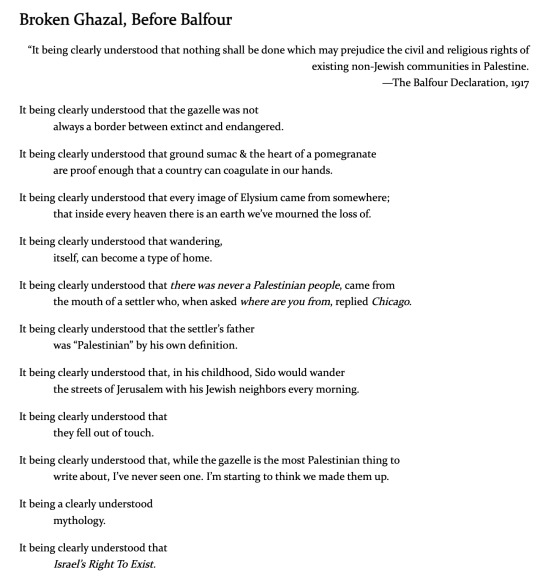
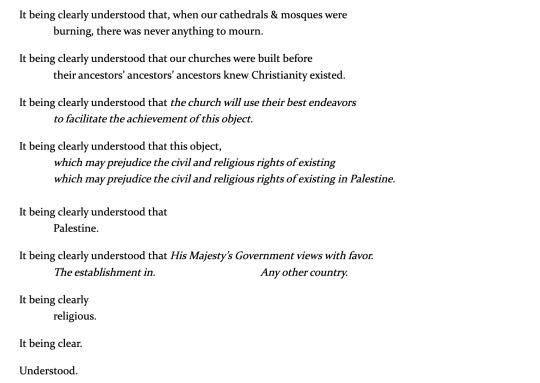
Broken Ghazal, Before Balfour by George Abraham
75 notes
·
View notes
Text

George Abraham, “Broken Ghazal, Before Balfour”
132 notes
·
View notes
Text
Read up on the history of European imperialism and Zionism in World War I. I mean it. You have to get it clear in your head that Israel would not exist without Christian European (and later, American) imperialism. Here's a short 5 Facts article, with links to longer lectures (with full transcripts):
Jewish Zionists were just some guys, and would have remained just some guys if the European powers with imperial military might hadn't decided that Zionism conveniently dovetailed with their agenda of maintaining/expanding their colonial empires. That's why (some of) the Jewish Zionists were lobbying for British patronage in the first place.
Excerpt from this lecture (that's also linked in the above 5 Facts article and has a full transcript):
Beginning around the 31 minute mark:
"Now, the saga of 1917 had one final, important chapter. On November 2nd, as British and Australian forces were engaging the Ottomans at the third battle of Gaza, Britain made yet another advance booking for the political arrangement of the postwar Middle East. The Balfour Declaration, which promised Zionists that Britain would sponsor the establishment of a Jewish homeland in Palestine.
Now the proximate origins of the Balfour Declaration traced back to the spring of 1917, when Lloyd George set Sykes the task of working for the addition of Palestine to the British area designated by the Sykes-Picot Accord. Sykes jumped at the chance to revise this accord, and by then Sykes had come to know about Zionism, an ideology at that time, barely 40 or 50 years old, which defined the Jews as a singular nation deserving of political sovereignty - the goal Zionists considered pressing given the incidents of anti-Semitism in the world, especially in the Russian Empire, where most European Jews lived.
In Zionism, Sykes saw an opportunity to nullify France's portion in an internationalized Palestine. He saw that a Jewish enclave in Palestine could function as a buffer protecting British, Egypt and the canal from imperial competitors. Sykes was encouraged when he learned that, for their part, the Zionists were interested in British patronage, without which they would be powerless to fulfill their dream.
But like the Hashemites, the Zionists didn't know anything about the Sykes-Picot Agreement. They had assumed that there would not be any type of conflict with any power.
There were, of course, other motives that prompted Sykes and British statesmen to support Zionism. One of these had to do with the belief among many British backing - who backed the Jewish territory, that the Jewish territorial nationalism might encourage Jews in the wavering countries of the United States and Russia to fully engage in the war until total victory. At the time, Russia was in a state of unrest and it wasn't certain to what extent the United States would sort of engage in the war.
There was this idea among the British that, you know, backing a Jewish homeland in Palestine would mobilize the power of Jewish financiers in the United States. But, of course, the idea that world Jewry acted as a bloc was an exaggeration of its unity and its ability to influence opinion. There are actually very few Zionists among the Jewish population in Europe or America.
Yet the idea of international Jewry was a common one, and it reflected the genteel and sometimes vociferous anti-Semitism that was current among the British upper class. But I must say that this was not an idea that the Zionists’ lobbyists in London made efforts to nullify. They saw that there is utility in this idea of a Jewish bloc, you know, heavily in favor of Zionism.
Yet another factor leading to British support for Zionism had to do with the visceral, romantic and religious sensibilities of these same British statesmen. Despite this defense advisory note that I was just talking about that dissuaded the media from religious pronouncements, men like Sykes, Lloyd George, Leo Emery and Foreign Secretary Balfour - whose name was appended to the declaration - shared with the people of Britain a pietistic instinct and were attracted to the idea of having a hand in the return of a people of the Bible to its ancestral homeland.
Lloyd George, the former chapel boy from North Wales, famously quipped that he knew the map of the Holy Land better than he did that of France. During his 1904 trip to Jerusalem, Sykes wrote, quote, 'Imagine how picturesque and interesting a walk in the city would be if the children of Israel retained their ancient and handsome dress.'
Sykes' mission to sabotage the Palestine portion of the French-British Agreement turned out to be rather simple and straightforward. During meetings in London, he convinced Zionism's leading lights Chaim Weizman and Nahum Sokolow to go directly to Georges-Picot and other French officials and argue their case. Sykes, in the meantime, would take care of the introductions and quietly reinforce the Zionist case at functions and over dinner drinks.
In the end, I think, due as much to Weizman and Sokolow's charm as to their arguments of justice and repatriation for the Jewish people, the French were won over agreeing that the plan for Palestine's internationalization should be rescinded. But then again, with no troops in the region, the French would have been powerless to make a contrary case. It's at this point that the Zionists got wind of the Sykes-Picot Agreement.
They got wind of this agreement in April 1917, just prior to the final dotting the I's and crossing of the T's. And they were shocked to see that Palestine, which they assumed was going to be theirs, was, according to the Sykes-Picot agreement, going to be internationalized. And thus they pressed Britain for the Balfour Declaration to make some sort of official pronouncement on the matter.
The declaration itself went through many revisions, every word in it was significant. The authors avoided the word 'state,' choosing the more ambiguous phrase 'national home.' Nor was the extent of this Jewish homeland made clear. It was to be somewhere in Palestine.
And although reference was made to the protection of the civil and religious rights of the indigenous native Arab population, the declaration said nothing about the Arabs’ political rights. In addition, the declaration promised that with the establishment of the homeland, no harm would come to Jews in any other country, meaning the Jews of Great Britain and other Western countries.
And here the intended target of this phrase were Jews belonging to the British establishment who were amongst the declaration's most vociferous opponents. Men like Edwin Montagu, a cabinet minister, feared that Zionism might lead some or even many within British society to call his and others’ patriotism into question, even accuse them of dual allegiance: are you loyal to the Crown or to the Jewish national home? And the declaration takes pains to make the point that this will not happen.
So in 1917 [...] Britain's conflicting agreements were finally exposed to the harsh lights."
25 notes
·
View notes
Text

“If we say nothing about Israel’s brazen slaughter of Palestinians, even as it is livestreamed into the most private recesses of our personal lives, we are complicit in it.”
If we say nothing about Israel’s brazen slaughter of Palestinians, even as it is livestreamed into the most private recesses of our personal lives, we are complicit in it. Something in our moral selves will be altered forever. Are we going to simply stand by and watch while homes, hospitals, refugee camps, schools, universities, archives are bombed, a million people displaced, and dead children pulled out from under the rubble? The borders of Gaza are sealed. People have nowhere to go. They have no shelter, no food, no water. The United Nations says more than half the population is starving. And still they are being bombed relentlessly. Are we going to once again watch a whole people being dehumanised to the point where their annihilation does not matter?
The project of dehumanising Palestinians did not begin with Benyamin Netanyahu and his crew—it began decades ago.
In 2002, on the first anniversary of September 11 2001, I delivered a lecture called “Come September” in the United States in which I spoke about other anniversaries of September 11—the 1973 CIA-backed coup against President Salvador Allende in Chile on that auspicious date, and then the speech on September 11, 1990, of George W. Bush, Sr., then US President, to a joint session of Congress, announcing his government’s decision to go to war against Iraq. And then I spoke about Palestine. I will read this section out and you will see that if I hadn’t told you it was written 21 years ago, you’d think it was about today.
September 11th has a tragic resonance in the Middle East, too. On the 11th of September 1922, ignoring Arab outrage, the British government proclaimed a mandate in Palestine, a follow-up to the 1917 Balfour Declaration which imperial Britain issued, with its army massed outside the gates of Gaza. The Balfour Declaration promised European Zionists a national home for Jewish people. (At the time, the Empire on which the Sun Never Set was free to snatch and bequeath national homelands like a school bully distributes marbles.)
How carelessly imperial power vivisected ancient civilisations. Palestine and Kashmir are imperial Britain’s festering, blood-drenched gifts to the modern world. Both are fault lines in the raging international conflicts of today.
In 1937, Winston Churchill said of the Palestinians, I quote, “I do not agree that the dog in a manger has the final right to the manger even though he may have lain there for a very long time. I do not admit that right. I do not admit for instance, that a great wrong has been done to the Red Indians of America or the black people of Australia. I do not admit that a wrong has been done to these people by the fact that a stronger race, a higher-grade race, a more worldly wise race to put it that way, has come in and taken their place.” That set the trend for the Israeli State’s attitude towards the Palestinians.
In 1969, Israeli Prime Minister Golda Meir said, “Palestinians do not exist.”
Her successor, Prime Minister Levi Eschol said, “What are Palestinians? When I came here (to Palestine), there were 250,000 non-Jews, mainly Arabs and Bedouins. It was a desert, more than underdeveloped. Nothing.” Prime Minister Menachem Begin called Palestinians “two-legged beasts”.
Prime Minister Yitzhak Shamir called them “grasshoppers” who could be crushed. This is the language of Heads of State, not the words of ordinary people.
Thus began that terrible myth about the Land without a People for a People without a Land.
In 1947, the U.N. formally partitioned Palestine and allotted 55 per cent of Palestine’s land to the Zionists. Within a year, they had captured 76 per cent. On the 14th of May 1948 the State of Israel was declared. Minutes after the declaration, the United States recognized Israel. The West Bank was annexed by Jordan. The Gaza Strip came under Egyptian military control, and Palestine formally ceased to exist except in the minds and hearts of the hundreds of thousands of Palestinian people who became refugees.
In 1967, Israel occupied the West Bank and the Gaza Strip. Over the decades there have been uprisings, wars, intifadas. Tens of thousands have lost their lives. Accords and treaties have been signed. Cease-fires declared and violated. But the bloodshed doesn’t end.
Palestine still remains illegally occupied. Its people live in inhuman conditions, in virtual Bantustans, where they are subjected to collective punishments, 24-hour curfews, where they are humiliated and brutalized on a daily basis. They never know when their homes will be demolished, when their children will be shot, when their precious trees will be cut, when their roads will be closed, when they will be allowed to walk down to the market to buy food and medicine. And when they will not. They live with no semblance of dignity. With not much hope in sight. They have no control over their lands, their security, their movement, their communication, their water supply. So when accords are signed, and words like “autonomy” and even “statehood” bandied about, it’s always worth asking: What sort of autonomy? What sort of State? What sort of rights will its citizens have? Young Palestinians who cannot control their anger turn themselves into human bombs and haunt Israel’s streets and public places, blowing themselves up, killing ordinary people, injecting terror into daily life, and eventually hardening both societies’ suspicion and mutual hatred of each other. Each bombing invites merciless reprisal and even more hardship on Palestinian people. But then suicide bombing is an act of individual despair, not a revolutionary tactic.
Although Palestinian attacks strike terror into Israeli citizens, they provide the perfect cover for the Israeli government’s daily incursions into Palestinian territory, the perfect excuse for old-fashioned, nineteenth-century colonialism, dressed up as a new-fashioned, 21st century “war”. Israel’s staunchest political and military ally is and always has been the US.
The US government has blocked, along with Israel, almost every UN resolution that sought a peaceful, equitable solution to the conflict. It has supported almost every war that Israel has fought. When Israel attacks Palestine, it is American missiles that smash through Palestinian homes. And every year Israel receives several billion dollars from the United States—taxpayers’ money.
Today every bomb that is dropped by Israel on the civilian population, every tank, and every bullet has the United States’ name on it. None of this would happen if the US wasn’t backing it wholeheartedly. All of us saw what happened at the meeting of the UN Security Council on December 8 when 13 member states voted for a ceasefire and the US voted against it. The disturbing video of the US Deputy Ambassador, a Black American, raising his hand to veto the resolution is burned into our brains. Some bitter commentators on the social media have called it Intersectional Imperialism.
Reading through the bureaucratese, what the US seemed to be saying is: Finish the Job. But Do it Kindly.
What lessons should we draw from this tragic conflict? Is it really impossible for Jewish people who suffered so cruelly themselves—more cruelly perhaps than any other people in history—to understand the vulnerability and the yearning of those whom they have displaced?
Does extreme suffering always kindle cruelty? What hope does this leave the human race with? What will happen to the Palestinian people in the event of a victory? When a nation without a state eventually proclaims a state, what kind of state will it be? What horrors will be perpetrated under its flag? Is it a separate state that we should be fighting for or, the rights to a life of liberty and dignity for everyone regardless of their ethnicity or religion?
Palestine was once a secular bulwark in the Middle East. But now the weak, undemocratic, by all accounts corrupt but avowedly nonsectarian PLO, is losing ground to Hamas, which espouses an overtly sectarian ideology and fights in the name of Islam. To quote from their manifesto: “we will be its soldiers and the firewood of its fire, which will burn the enemies”. The world is called upon to condemn suicide bombers. But can we ignore the long road they have journeyed on before they have arrived at this destination?
September 11, 1922 to September 11, 2002—80 years is a long time to have been waging war. Is there some advice the world can give the people of Palestine? Should they just take Golda Meir’s suggestion and make a real effort not to exist?”
The idea of the erasure, the annihilation, of Palestinians is being clearly articulated by Israeli political and military officials.
A US lawyer who has brought a case against the Biden administration for its “failure to prevent genocide”—which is a crime, too—spoke of how rare it is for genocidal intent to be so clearly and publicly articulated. Once they have achieved that goal, perhaps the plan is to have museums showcasing Palestinian culture and handicrafts, restaurants serving ethnic Palestinian food, maybe a Sound and Light show of how lively Old Gaza used to be—in the new Gaza Harbour at the head of the Ben Gurion canal project, which is supposedly being planned to rival the Suez Canal. Allegedly contracts for offshore drilling are already being signed.
Twenty-one years ago, when I delivered “Come September” in New Mexico, there was a kind of omertà in the US around Palestine. Those who spoke about it paid a huge price for doing so. Today the young are on the streets, led from the front by Jews as well as Palestinians, raging about what their government, the US government, is doing. Universities, including the most elite campuses, are on the boil. Capitalism is moving fast to shut them down. Donors are threatening to withhold funds, thereby deciding what American students may or may not say, and how they may or may not think. A shot to the heart of the foundational principles of a so-called liberal education.
Gone is any pretense of post-colonialism, multiculturalism, international law, the Geneva Conventions, the Universal Declaration of Human Rights. Gone is any pretence of Free Speech or public morality. A “war” that lawyers and scholars of international law say meets all the legal criterion of a genocide is taking place in which the perpetrators have cast themselves as victims, the colonisers who run an apartheid state have cast themselves as the oppressed. In the US, to question this is to be charged with anti-Semitism, even if those questioning it are Jewish themselves.
It’s mind-bending. Even Israel—where dissident Israeli citizens like Gideon Levy are the most knowledgeable and incisive critics of Israeli actions—does not police speech in the way the US does (although that is rapidly changing, too). In the US, to speak of Intifada—uprising, resistance—in this case against genocide, against your own erasure—is considered to be a call for the genocide of Jews.
The only moral thing Palestinian civilians can do apparently is to die. The only legal thing the rest of us can do is to watch them die. And be silent. If not, we risk our scholarships, grants, lecture fees and livelihoods.”

Arundhati Roy
13 notes
·
View notes
Text
Death ed Stuart David Schiff

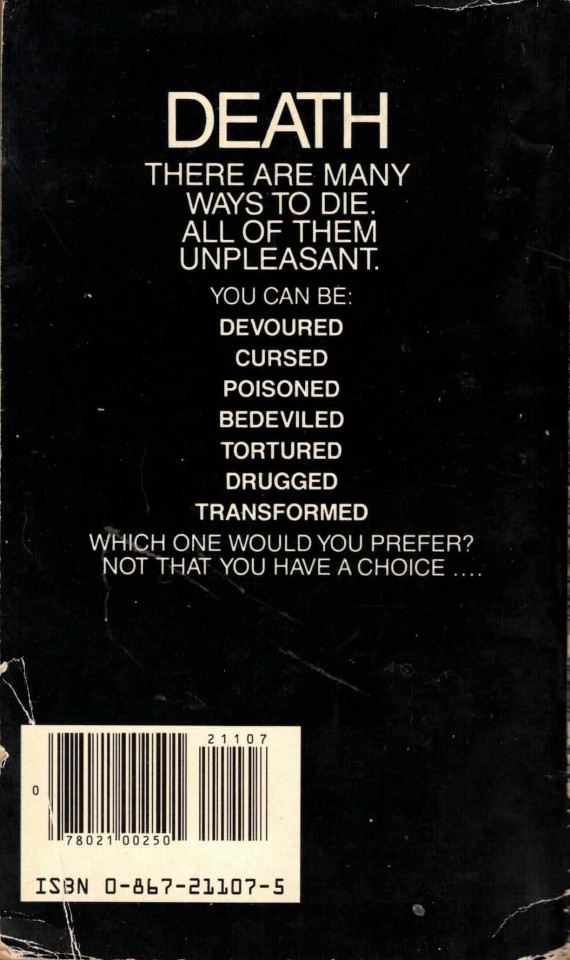
Death
ed Stuart David Schiff
1982, Playboy Paperbacks
Two Bottles of Relish by Lord Dunsany (orig Time & Tide, Nov 12, 1932)
A variation on a locked door mystery - a body disposal without leaving the house mystery. This one stayed with me since childhood, though the premise wasn't as locked in as it could be.
Deathtracks by Dennis Etchison
A Nielson family survey taker visits a couple who look for hidden messages in TV laugh tracks to explain why their son died in Vietnam.
Always Together by Hugh B. Cave
One elderly twin murders the other and keeps up a ruse that she's still alive. A good setup for a twist in the tale which never happens.
Toilet Paper Run by Juleen Brantingham
Engaging story set in a girls' reform school, but the ending felt tacked on to fit the genre.
The Green Parrot by Joseph Payne Brennan (orig Weird Tales, July 1952)
Another boring entry in the "that person you thought was alive turns out was already dead" style of ghost story.
Fragment from a Charred Diary by Davis Grubb
Comedy piece about a man using a voodoo doll to commit the political assassinations of the 1960s, escalating from there.
The Scarf by Bernice Balfour
A disfigured woman concealing her face with a scarf and a curious newspaper delivery boy.
Sentences by Richard Christian Matheson
Comedy twist in the tale about a man getting his life rewritten.
Prickly by David A. Riley
A child corrupting Satanist with a monkey familiar kills himself in a British tenement building. Years later, strange creatures scuttle the halls, and children sing nursery rhymes about Prickly.
The Kennel by Maurice Level (orig Tales of Mystery and Horror, 1920)
A cuckold husband finds the body of his wife's lover and disposes of it.
Onawa by Alan Ryan
An adoptive native girl with a taste for blood
A Telephone Booth by Wade Kenny
A gambler can get tips from the future from a pay phone.
Straw Goat by Ken Wiseman
Folk horror with murderous farmers and a sacrificial straw goat.
Horrible Imaginings by Fritz Leiber
Long piece about a creep being obsessed with his neighbor, which I skipped.
The Blind Spot by Saki (orig Beasts and Super-Beasts, 1914)
Comedy piece about a killer servant.
The Dust by Al Sarrantonio
A simpleton shut-in is obsessed with dust.
It Grows on You by Stephen King
A vignette of small town misery which feels more like background to a fuller story. It's been re-written a few times, and later versions may be more tied in to the Castle Rock mythos and be more explicitly horrific. Something about a house getting a new wing built connected with people dying, but not much meat on the bones here.
The Copper Bowl by George Fielding Eliot (orig Weird Tales, December 1928)
Nasty proto-shudder pulp yellow peril story of a French Legionnaire's love being tortured by a Chinese despot.
From Amazon https://amzn.to/3vkEvlR
11 notes
·
View notes
Text
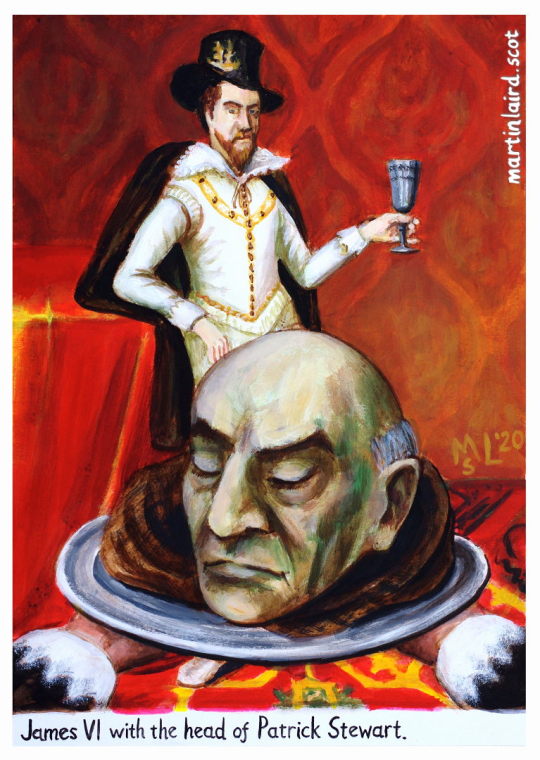
On February 6th 1615, Patrick Stewart, the tyrannical 2nd Earl of Orkney was beheaded in Edinburgh for treason.
As promised, a follow on from Sunday's post about Robert Stewart, an equally unpleasant member of the Stewar family that influenced Scotland so much.
Ultimately a footnote in the sweep of Scottish history, the earl was — and remains — locally infamous for his decadence and cruelty. He persecuted “witches” gleefully, one name : Alison Balfour, he accused of attempting to murder him. Stewart said that absent vigorous prosecution his subjects “wald all have becommit witches and warlockis for the people ar naturally inclynit thairto,” though the property forfeiture accompanying a witchcraft conviction might also have had something to do with it.
None of this had aught to do with the noble’s fall, although it was cited against him in passing; a treason charge for usurping royal authority arising from parochial jockeying for power did him in.
For those paying attention this basically follows up Friday’s post and sees the karma playing a part.
In 1593, the “iron grip” of the Stewart earls passed from Earl Robert to his second son, 28-year-old Patrick Stewart.
Like his father before him, Patrick’s rule over Orkney was not a particularly pleasant one, earning him the nickname “Black Patie”.
Patrick’s reputation for extravagance, arrogance and greed was matched only by his love of finery - exemplified in the magnificent Earl’s Palace in Kirkwall.
Stewart held the native Orcadians in very low regard. When not bickering with his own family, his time was spent feuding with the more powerful local families.
By 1606, Earl Patrick was heavily in debt and ignored a summons to appear before the Privy Council, in Edinburgh, to explain the complaints received regarding his extremely oppressive rule. He was even charged with treason but the charge was dropped in 1607, such was the power of The Stewarts.
The appointment of Bishop James Law, in the same year, marked the beginning of Patrick’s end. The bishop, a close friend and confidante of the Scottish king, James VI, presented a petition before the king, describing the oppression suffered by the people of Orkney. It is thought he also made mention of the danger the Stewart family posed - at this time the islands were still more Norse than Scottish. The latter statement probably prompted the King to take action.
In 1610, at the age of 35, Earl Patrick Stewart was indicted on seven charges of treason, on the ground of usurping royal authority. He remained in Edinburgh Castle, despite pleading justification for his actions on the islands’ County Laws.
While incarcerated, Patrick appointed his illegitimate son, Robert, as his deputy in Orkney. Robert had instructions to regain his father’s “houses” and to collect rents to prepare for his hoped-for restoration to the Earldom.
Robert’s attempt to comply with his fathers orders resulted in what amount to a rebellion against royal authority. Earl George Sinclair of Caithness - who had a score to settle with the Stewarts - came to the King’s aid, volunteering to lead and pay for an expedition to Orkney to quash Robert Stewart’s rebellion.
After a long siege of the Kirkwall Castle, the Bishop’s Palace and St Magnus Cathedral - where supporters were garrisoned - the Stewart rebellion was brought to its knees by the work of a traitor working from the inside.
Earl George threatened to demolish St Magnus’ Cathedral as a reprisal against the Orcadians who had nearly ruined him but fortunately Bishop Law persuaded him otherwise.
Patrick Stewart, the man destined to become Orkney’s most despised earl, was found guilty of treason in 1615, and subsequently beheaded. And according to tradition, so wicked was he that his execution had to be delayed for several days to give him time to learn the Lord’s Prayer.
As I touched upon earlier the accusation of witchcraft had become a particularly convenient way of depriving people of their land - in the following century there were many trials, often beginning in St Magnus Cathedral and ending at the stake.
And so the tyrannical Stewart’s reign ended in the northern isles. The picture shows Coat of arms of Earl Patrick. The first and fourth quarters show the Scottish royal arms debruised by a ribbon, a symbol of bastardy, while the second and third quarters show the arms of the Earldom of Orkney, you might recall from Monday’s post the Stewarts sprang from illegitimate children of King James the V. Other pic is The Earls Palace ruins at Kirkwall.
Such was their prowess at spreading their seed that recent DNA research shows that a remarkable round half of men with the Stuart or Stewart surname - regardless of the spelling - are believed to carry a unique marker in their Y chromosome which identifies them as the direct descendants of a 13th Century nobleman who fought alongside William Wallace and whose subsequent lineage includes the Stuart monarch, James VI of Scotland, so if you are a man and your surname’s Stewart/Stuart, around about half of you have royal lineage.
Pic is by Martin Laird https://martinlaird.scot/drawing-painting/james-vi-earl-patrick-stewart/
7 notes
·
View notes
Text
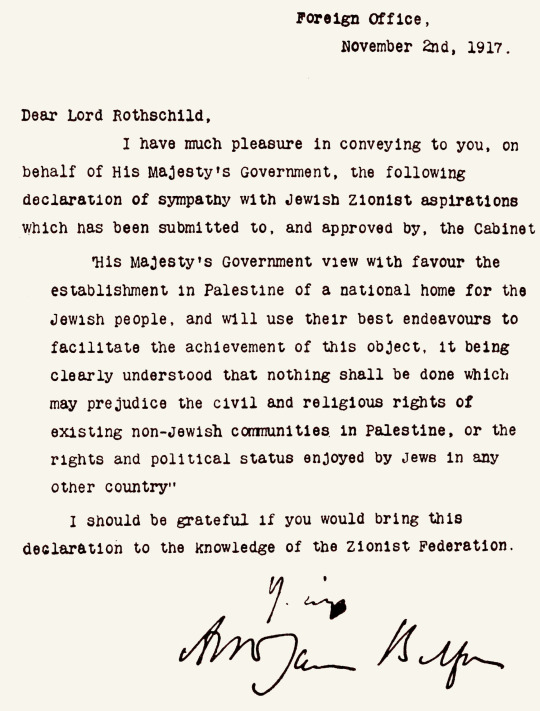
The Balfour Declaration was a public statement issued by the British government in 1917 during the First World War announcing its support for the establishment of a "national home for the Jewish people" in Palestine.
The statement was the product of Zionist advocates inside the government (including Balfour, Prime Minister David Lloyd George , and cabinet member Herbert Samuel ), and from outside; of paramount importance was the immensely energetic and persuasive Zionist spokesman Chaim Weizmann , who had longstanding close relationships with Balfour, Lloyd George, Winston Churchill , and other powerful figures of the political elite. From a strategic perspective, British officials hoped that taking a “favourable view” toward a Jewish national home in Palestine would garner Jewish support in the United States , Germany , and Russia , thus bolstering the war effort. They also sought to solidify postwar British claims to Palestine to shore up control over Egypt and the Suez Canal .
Shortly after the declaration was issued, British troops entered Palestine, capturing Jerusalem in December 1917. Occupation of the entire country was completed by October 1918, and military government was imposed. Preparations were immediately made to start implementing the Balfour Jewish National Home policy. Less than two years later (and before Britain was formally assigned the Mandate over Palestine), Sir Herbert Samuel, an avowed Zionist, became Palestine's first High Commissioner, and in August 1920 the first immigration ordinance was passed by the new Civilian Administration, opening Palestine to Jewish immigration. Source
15 notes
·
View notes
Text
As Israelis and Palestinians mourn the dead and fearfully await news of those now missing, the tendency to look for someone to blame is impossible for many to resist. Israelis and their supporters want to pin all the blame on Hamas, whose direct responsibility for the horrific attack on Israeli civilians is beyond question. Those more sympathetic to the Palestinian cause see the tragedy as the inevitable result of decades of occupation and Israel’s harsh and prolonged treatment of its Palestinian subjects.
Others insist there is plenty of blame to go around, and that anyone who sees one side as wholly innocent and the other as solely responsible has lost any capacity for fair-minded judgment.
Inevitably, arguing over which of the immediate protagonists is most at fault obscures other important causes that are only loosely related to the long conflict between Zionist Israelis and Palestinian Arabs. We should not lose sight of these other factors even during the present crisis, however, because their effects may continue to echo long after the current fighting stops.
Where one begins to trace causes is inherently arbitrary (Theodor Herzl’s 1896 book, The Jewish State? the 1917 Balfour Declaration? the Arab revolt of 1936? the 1947 U.N. partition plan? the 1948 Arab-Israeli war, or the 1967 Six-Day War?), but I’ll start in 1991, when the United States emerged as the unchallenged external power in Middle East affairs and began trying to construct a regional order that served its interests.
Within that broader context, there are at least five key episodes or elements that helped bring us to the tragic events of the past two weeks.
The first moment was the 1991 Gulf War and its aftermath: the Madrid peace conference. The Gulf War was a stunning display of U.S. military power and diplomatic artistry that removed the threat that Saddam Hussein had posed to the regional balance of power. With the Soviet Union nearing collapse, the United States was now firmly in the driver’s seat. Then- President George H. W. Bush, Secretary of State James Baker, and an experienced Middle East team seized upon this opportunity to convene a peace conference in October 1991, which included representatives from Israel, Syria, Lebanon, Egypt, the European Economic Community, and a joint Jordanian/Palestinian delegation.
Although the conference did not produce tangible results—let alone a final peace agreement—it laid the groundwork for a serious effort to construct a peaceful regional order. It is tantalizing to contemplate what might have been achieved if Bush had been reelected in 1992 and his team had been given the opportunity to continue their work.
Yet Madrid also contained a fateful flaw, one that sowed the seeds of much future trouble. Iran was not invited to participate in the conference, and it responded to being excluded by organizing a meeting of “rejectionist” forces and reaching out to Palestinian groups—including Hamas and Islamic Jihad—that it had previously ignored. As Trita Parsi observes in his book Treacherous Alliance, “Iran viewed itself as a major regional power and expected a seat at the table,” because Madrid was “not seen as just a conference on the Israeli-Palestinian conflict, but as the defining moment in forming the new Middle East order.” Tehran’s response to Madrid was primarily strategic rather than ideological: It sought to demonstrate to the United States and others that it could derail their efforts to create a new regional order if its interests were not taken into account.
And that is precisely what happened, as suicide bombings and other acts of extremist violence disrupted the Oslo Accords negotiation process and undermined Israeli support for a negotiated settlement. Over time, as peace remained elusive and relations between Iran and the West deteriorated further, the ties between Hamas and Iran grew stronger.
The second critical event was the fateful combination of the Sept. 11, 2001 terrorist attacks and the subsequent U.S. invasion of Iraq in 2003. The decision to invade Iraq was only tangentially related to the Israeli-Palestinian conflict, even though Ba’athist Iraq had backed the Palestinian cause in several ways. The George W. Bush administration believed that toppling Saddam would eliminate the supposed threat of Iraqi weapons of mass destruction, remind adversaries of U.S. power, strike a blow against terrorism more broadly, and pave the way for a radical transformation of the entire Middle East along democratic lines.
What they got, alas, was a costly quagmire in Iraq and a dramatic improvement in Iran’s strategic position. This shift in the balance of power in the Gulf alarmed Saudi Arabia and other Gulf states, and perceptions of a shared threat from Iran began to reshape regional relationships in important ways, including by altering some Arab states’ relations with Israel. Fears of U.S.-led “regime change” also encouraged Iran to pursue a latent nuclear weapons capability, leading to a steady increase in its enrichment capacity and ever-tighter U.S. and U.N. sanctions.
With hindsight, a third key event was then-U.S. President Donald Trump’s fateful abandonment of the 2015 Joint Comprehensive Plan of Action (JCPOA) with Iran and his adoption of a policy of “maximum pressure” instead. This foolish decision had several unfortunate effects: Leaving the JCPOA allowed Iran to restart its nuclear program and move much closer to an actual weapons capability, and the maximum pressure campaign led Iran to attack oil shipments and facilities in the Persian Gulf and Saudi Arabia, to show the United States that its attempt to compel or overthrow them was not without costs and risks.
As one would expect, these developments heightened the concerns of the Saudis and increased their interest in acquiring nuclear infrastructure of their own. And as realist theory predicts, perceptions of a growing threat from Iran encouraged quiet but significant forms of security cooperation between Israel and several Gulf states.
The fourth development was the so-called Abraham Accords, in some ways a logical extension of Trump’s decision to leave the JCPOA. The brainchild of amateur strategist (and Trump’s son-in-law) Jared Kushner, the accords were a series of bilateral agreements normalizing relations between Israel and Morocco, Bahrain, the United Arab Emirates, and Sudan. Critics noted that the accords did relatively little to advance the cause of peace because none of the participating Arab governments were actively hostile to Israel or capable of harming it. Others warned that regional peace would remain elusive as long as the fate of the 7 million Palestinians living under Israeli control was unresolved.
The Biden administration continued along much the same path. It took no meaningful steps to stop Israel’s increasingly far-right government from backing violent actions by extremist settlers, which led to a surge in Palestinian deaths and displacements over the past two years. After failing to fulfill a campaign promise to immediately rejoin the JCPOA, Biden and Co. focused their main efforts on persuading Saudi Arabia to normalize relations with Israel in exchange for some sort of U.S. security guarantee and perhaps access to advanced nuclear technology.
The motivation for this effort had little to do with Israel-Palestine, however, and was mostly intended to keep Saudi Arabia from moving closer to China. Linking a security commitment to Saudi Arabia with normalization was primarily a way to overcome U.S. congressional reluctance to a sweetheart deal with Riyadh. Like Israeli Prime Minister Benjamin Netanyahu and his cabinet, top U.S. officials appear to have assumed that there was nothing that any Palestinian group could do to derail or slow this process or draw attention back to their plight.
Unfortunately, the rumored deal gave Hamas a powerful incentive to show just how wrong this assumption was. Recognizing this fact in no way justifies what Hamas did and especially the intentional brutality of the attacks; it is simply to acknowledge that Hamas’s decision to do something—and especially its timing—was a response to regional developments that were driven to a considerable extent by other concerns.
As I noted in my last column, the fifth factor is not a single event but rather the United States’ enduring failure to bring the so-called peace process to a successful end. Washington had monopolized stewardship of the peace process ever since the Oslo Accords (which, as the name implies, came about due to Norwegian mediation), and its various efforts over the years ultimately led nowhere. Former U.S. Presidents Bill Clinton, George W. Bush, and Barack Obama repeatedly declared that the United States—the world’s most powerful country in the full flush of its so-called unipolar moment—was committed to achieving a two-state solution, but that outcome is now farther away than ever and probably impossible.
These background elements are important because the nature of the future global order is up for grabs, and several influential states are challenging the intermittently liberal and inconsistently followed “rules-based order” that the United States has championed for decades. China, Russia, India, South Africa, Brazil, Iran, and others openly call for a more multipolar order, where power is more evenly shared. They want to see a world where the United States no longer acts as the so-called indispensable power, as one that expects others to follow its rules while reserving the right to disregard them whenever they prove inconvenient.
Unfortunately for the United States, the five events I just described and their impact on the region provide potent ammunition for the revisionist position (as Russian President Vladimir Putin was quick to point out last week). “Just look at the Middle East,” they might say. “The United States has been managing the region by itself for more than three decades, and what has its ‘leadership’ produced? We see devastating wars in Iraq, Syria, Sudan, and Yemen. Lebanon is on life support, there is anarchy in Libya, and Egypt is lurching toward collapse. Terrorist groups have morphed and mutated and sown fear on several continents, and Iran keeps edging closer to the bomb. There is no security for Israel and neither security nor justice for the Palestinians. This is what you get when you let Washington run everything, my friends. Whatever their intentions may have been, U.S. leaders have repeatedly shown us that they lack the wisdom and objectivity to deliver positive results, not even for themselves.”
One can easily imagine a Chinese official adding: “May I point out that we have good relations with everyone in the region, and our only vital interest there is reliable access to energy. We are therefore committed to keeping the region quiet and peaceful, which is why we helped Iran and Saudi Arabia reestablish ties last year. Isn’t it obvious that the world would benefit if the U.S. role there declined and ours increased?”
If you don’t think a message like this would resonate outside the comfortable confines of the trans-Atlantic community, then you haven’t been paying attention. And if you are also someone who thinks that addressing the challenge of a rising China is a top priority, you may want to reflect on how the United States’ past actions contributed to the present crisis—and how the shadow of the past will continue to undermine the U.S. standing in the world in the future.
To their credit, over the past week Biden and his foreign-policy team have been doing what they do best, namely, managing a crisis that was at least partly of their own making. They are working overtime to limit the damage, prevent the conflict from spreading, contain the domestic political fallout, and (fingers crossed) bring the violence to an end. We should all hope that their efforts succeed.
But as I noted more than a year ago, the administration’s foreign-policy team are best seen as skilled mechanics but not architects, and in an era where the institutional architecture of world politics is increasingly an issue and new blueprints are needed. They are adept at using the tools of U.S. power and the machinery of government to address short-term problems, but they are stuck in an outdated vision of America’s global role, to include how its handling of its various Middle East clients. It is obvious that they badly misread where the Middle East was headed, and applying Band-Aids today—even if it is being done with energy and skill—will still leave the underlying wounds untreated.
If the end result of Biden and Secretary of State Antony Blinken’s current ministrations is merely a return to the pre-Oct. 7 status quo, I fear that the rest of the world will look on, shake its head in dismay and disapproval, and conclude that it’s time for a different approach.
12 notes
·
View notes
Text
📅 ‘We are told that Freud’s Last Session movie will be released around December’
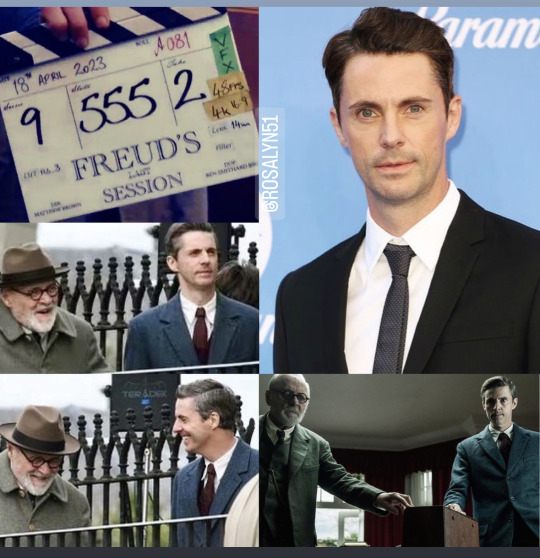
“We are told that Freud’s Last Session movie will be released around December” 2023!!! according to Lisa Adair, General Manager, The Railway Preservation Society of Ireland (RPSI) via Northern Ireland World News (April 26, 2023)
Rosalyn51 Note: A theatrical release by December 31, 2023 qualifies the film for 2024 Oscars nominations! Best Picture, Best Actor, Best Supporting Actor, Best Adapted Screenplay, etc. There is already incredible Oscars BuZZ (Variety)
Scenes from new movie starring Sir Anthony Hopkins shot in Whitehead
Filming has taken place in Whitehead for a new movie featuring acclaimed actors Sir Anthony Hopkins and Matthew GoodE.
Whitehead Railway Museum was the recent setting for scenes from ‘Freud’s Last Session’.
Set on the eve of World War Two in 1939, the film sees Sigmund Freud (Sir Anthony) invite Belfast-born Christian author CS Lewis for a debate on the existence of God. Having taken up the invite, CS Lewis, played by Goode, was present at Whitehead - suitably dressed as a rural Oxfordshire station - in order to catch the train to see Freud.
Also present were many extras, including a platoon of soldiers, a class of primary school children dressed for evacuation, and some of their ‘mothers’ to see them off.

100-year-old steam engine No. 461 was used in the Whitehead film shoot (archive image).
The station building, which normally houses Platform 3 restaurant, underwent a makeover so that it looked like a period 1930s English railway halt.
The Railway Preservation Society of Ireland (RPSI) laid on a train of 100-year-old steam engine No. 461, which is usually on display at the museum, plus three heritage carriages and a luggage van.

The locomotive was out of steam but fitted with a steam machine, while the RPSI’s train rides steam engine No. 3BG was on hand to shunt the train up and down the siding as required. The train had to be filmed in three main positions:
Sitting stationary at the platform whilst passengers / evacuees embarked and disembarked;
Departing with CS Lewis aboard (in daylight);
Arriving back with CS Lewis having met Freud (in the dark).

Photo: Freud’s Last Session producer, Meg Thomson IG
The weather was bright and sunny for the daylight shoots, and calm for the filming after darkness fell. The work was completed by 10.30pm [April 18, 2023] and a cheer went up from the cast and crew because this was the final sequence in the shoot.

Photo: Freud’s Last Session producer, Meg Thomson IG
Lisa Adair, RPSI general manager, said: “We are regularly in demand from film-makers because we can provide steam engines and vintage carriages. We are always pleased to be able to assist.
“We are told that Freud’s Last Session will be released around December, so we look forward to seeing the finished product in the cinema.”
______
Freud’s Last Session (2023)
SYNOPSIS:
On the eve of the Second World War, two of the greatest minds on the twentieth century, C.S. LEWIS and SIGMUND FREUD converge for their own personal battle over the existence of God. FREUD’S LAST SESSION interweaves the lives of Freud and Lewis, past, present, and through fantasy, bursting from the confines of Freud’s study on a dynamic journey.
DIRECTED BY:
Matthew Brown
WRITTEN BY:
Mark St. Germain
STARRING:
Anthony Hopkins (Sigmund Freud)
Matthew GoodE (C. S. "Jack" Lewis)
Liv Lisa Fries (Anna Freud)
Jodie Balfour (Dorothy Burlingham)
Jeremy Northam
Stephen Campbell Moore (? J. R. R. Tolkien ?)
Orla Bady (? Mrs. Janie Moore?)
Rhys Mannion (C. S. Lewis; WW! era)
Pádraic Delaney (Warren "Warnie" Lewis)
Tarek Bishara (? Ernest Freud ?)
George Clarke (Paddy Moore)
Oscar and Lucas Massey (twin boys of producer Meg Thomson who are playing the young Lewis brothers)
Photo collage: Originals Producer Meg Thompson, Mark Doyle, DigitalSpy, Patrick Redmond/ Westend Films
#FreudsLastSession #FLSLoc
#matthew goode#anthony hopkins#freud's last session#matthewgoode#henry talbot#downton abbey#a discovery of witches#freud's last session movie#sigmund freud#c s lewis#jodi balfour#liv lisa fries#jeremy northam#stephen campbell moore#orla brady#padraic delaney#anna freud#dorothy burlingham#freud#psychoanalysis#freudslastsession#oscars 2024#oscars predictions#best actor#best supporting actor#best picture#best adapted screenplay#mark st germain#the crown netflix#goode performance
30 notes
·
View notes
Text
T.E. Lawrence and his fondness for pranks and practical jokes
Many people who knew Lawrence, noticed his unique sense of humor and fondness of jokes and the subtle, spontaneous and individual nature of his pranks.
While at Carchemish he decorated Hogarth’s normally simple mud-walled room with pink satin curtains trimmed with lace and adorned with big pink bows. A pink cushion, hairpins, cheap scents and other reminders of domestic life were distributed about the room to make Hogarth feel “at home.” Hogarth not unexpectedly flew into something of a rage when he discovered the joke, but Lawrence, according to Woolley, grinned over the jest for days. Yet (also according to Woolley) Lawrence was himself unusually sensitive to ridicule and could not tolerate jokes made at his own expense.
T.E. also decorated the lintel of the main doorway into the house at Carchemish (it was a sun disk, with crescent moon, and wings carved with a screw-driver and a knife) to imitate Hittite design. His delight with this joke would be renewed each time a visitor to the excavations paused to admire the forged Hittite relic.
In Seven Pillars of Wisdom T.E. described how he parodied the style of Auda's storytelling to the amusement of everyone present, including Auda himself:
"Everyone had heard that sunrise twenty times, in its immense bathos; an agony piled up of linked phrases, repeated and repeated with breathless excitement by Auda to carry over for hours the thrill of a raiding story in which nothing happened; and the trivial rest of it was exaggerated the degree which made it like one of Auda's tales; and yet, also, the history of the walk to market at Wejh which many of us had taken. The tribe was in waves of laughter on the ground. Auda laughed the loudest and longest, for he loved a jest upon himself; and the fatuousness of my epic had shown him his own sure mastery of descriptive action."
Meinertzhagen claimed that during the time of Paris Peace Conference he and Lawrence hid themselves at the top of the stairs of the Astoria Hotel, unfurled rolls of toilet paper, and dropped them down in long strips on the heads of Lloyd George, Balfour, and Lord Hardinge, who were standing in the lobby, prompting Hardinge to remark: “There is nothing funny about toilet paper.”
According to Graves, Lawrence once climbed a tower at All Souls to hang the Hejaz flag from its peak, kidnapped a deer from the Magdalen College deer park, and rang the station bell he had captured from Tell Shahm from his window at night. He was at the time a thirty-one-year-old retired officer.
27 notes
·
View notes
Text
Freud's Last Session
Freud's Last Session (2023)
#MattBrown #AnthonyHopkins #MatthewGoode #LivLisaFries #JodiBalfour #PadraicDelaney
Mehr auf:
Jahr: 2023 (Dezember)
Genre: Drama
Regie: Matt Brown
Hauptrollen: Anthony Hopkins, Matthew Goode, Liv Lisa Fries, Jodi Balfour, Padraic Delaney, Stephen Campbell Moore, Rhys Mannion, George Andrew-Clarke, Orla Brady, Gary Buckley, Tarek Bishara, Jeremy Northam …
Filmbeschreibung: Am Vorabend des Zweiten Weltkriegs treffen zwei der größten Denker des zwanzigsten Jahrhunderts, C.S. Lewis…
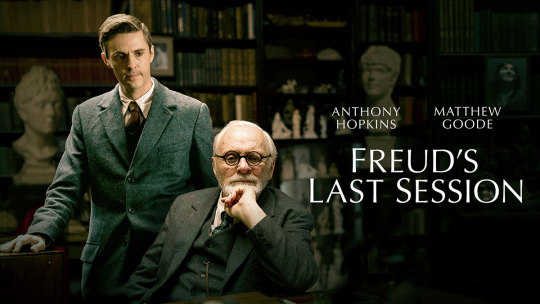
View On WordPress
6 notes
·
View notes